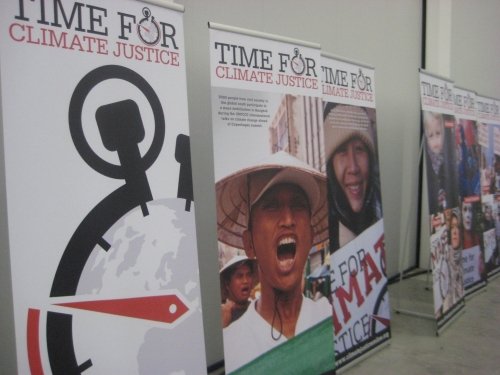 正在墨西哥坎昆进行的气候谈判已过半,各国面临一个重要的决定。还有一个星期,他们将不得不决定:他们是否能够接受摆在桌面上的协议?这不是一个简单的决定,不是要决定每个国家是否都进行了足够的讨价还价,是否都最大程度地说服对方,或捍卫了自己国家的利益。而是要决定各国是否要“锁定”在哥本哈根会议前后做出的减排承诺,是否能达成平衡的协定并采取切实行动来加强减排行动的透明度。这个协议也将有助于加快发展中国家的清洁能源发展,减少森林砍伐,帮助最脆弱的国家适应气候变化的影响。这才是真正有意义的行动,而如果下周各国无法做出具体决定,那么这些行动可能遭受重大挫折。
正在墨西哥坎昆进行的气候谈判已过半,各国面临一个重要的决定。还有一个星期,他们将不得不决定:他们是否能够接受摆在桌面上的协议?这不是一个简单的决定,不是要决定每个国家是否都进行了足够的讨价还价,是否都最大程度地说服对方,或捍卫了自己国家的利益。而是要决定各国是否要“锁定”在哥本哈根会议前后做出的减排承诺,是否能达成平衡的协定并采取切实行动来加强减排行动的透明度。这个协议也将有助于加快发展中国家的清洁能源发展,减少森林砍伐,帮助最脆弱的国家适应气候变化的影响。这才是真正有意义的行动,而如果下周各国无法做出具体决定,那么这些行动可能遭受重大挫折。
对关键问题的真正的协议就在眼前。在过去的这一周中,我觉得还是有理由保持乐观。我们已经看到各国试图更好地了解别国立场的实际影响。在有些场合我们已经看到了“妥协”精神,因为没有办法能让所有国家得到他们想要的一切。当谈判代表已经能够坐下来讨论这些问题各自的实际影响的时候,也就意味着本周里各国在关键问题上的立场更接近了。确实,在有些议题上各国还是存在真正的差异的,但它们不是不可克服的。
所以过去的一周我们已经看到各国为本次坎昆气候谈判能实现的重要行动在积极做准备了。这些进展包括:
• 透明度和负责性,以确保所有国家采取他们承诺实现的行动。该体系还可以使采取了行动的国家获得应得的国际认可(减排信息的“测量、报告、核实”和“国际磋商和分析”规定)。
• 建立一个全球气候基金,这将有助于有针对性地调动大量资源以帮助发展中国家减少毁林排放、发展清洁能源、适应气候变化的影响。
• 建立起衡量全球减少毁林排放行动的参数,以确保发展中国家有足够资金保护生物多样性、社会福利、原住民和社区的权利,并保留天然林。
• 建立协助发展中国家发展清洁能源的机制,同意在世界不同地区建立“科技中心”和“网络”。这将有助于各国发掘利用自己在清洁能源和能源效率方面的重点专业知识和解决方案,使其在满足能源需求的同时,也减少温室气体排放。
• 制定针对“气候变化适应”的体制安排,帮助已经受到气候变化影响并最易受其侵害的脆弱人群和地区。这将帮助那些生存和生活都受到全球变暖严重威胁的人们。
《联合国气候变化框架公约》(UNFCCC)12月4日发布了新的长期合作特设工作组(LCA)案文,其中包含了在墨西哥达成协议的所有关键要素。这份文本为下周的协议阶段打下了基础,但前提是各国要想办法做些让步。缩小仍然存在的分歧是不容易的。然而,下周如果没有达成协议将意味着领导力和创造性的全面失败。
决定的时刻也正在迅速临近“最脆弱”的国家和“中型”的国家。非洲国家、小岛屿国家以及拉丁美洲和亚洲的一些国家必须看看眼前的选择并决定:他们是否可以接受摆在他们面前的提议,即使是不完美的?有些能今年在墨西哥得到部分解决的问题可能明年不会再拿出来商讨。接下来的一周各国不仅会敲定一些协议,还会为明年选定一些突破点。或许到了明年,有些选择就不存在了,或许到了明年我们拥有的选项将和今天非常不同。这些和其他国家如若不立即采取行动,所带来的损失是他们承担不起的。这不是一个“要么接受,要么放弃”的问题。而是:“拿好你现在可以争取到的,使其到明年变得更深入更强硬,为未来完成更重要的行动打下基础。”应对全球变暖的实际行动实在是太紧迫了,必须在这里–在本次坎昆会议上–得到推进。
第二周是可能达成协议的,但前提是:缩小仍然存在分歧。下周如果没有达成协议将意味着领导力和创造性的全面失败。聚集在这里的国家必须成功地解决这一严峻的挑战。正如墨西哥外长埃斯皮诺萨(本次会议主席)所说的:“我们是真正意义上已进入坎昆谈判的最后阶段”。


